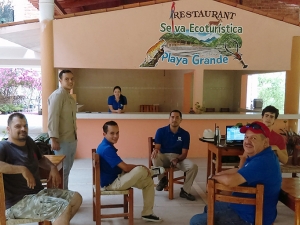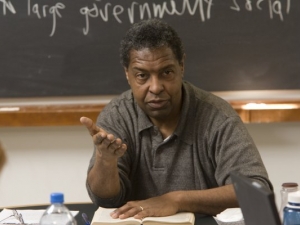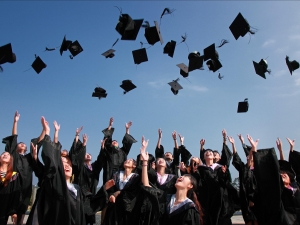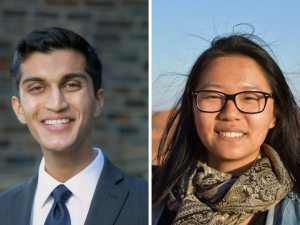“Getting my Ph.D. was the best of times and the worst of times, and hopefully it will be the same for you.” With that, Director of Undergraduate Studies Dr. Connel Fullenkamp welcomed the newest cohort of economics Ph.D. students to Duke’s campus. While it may still feel like summer in Durham, the start of the new semester is just around the corner. Out of 698 total applicants, there are 15 new Ph.D. students in this year’s class. They are from China, United States, Philippines, Italy, South Korea, Bolivia, and… read more about New Cohort of Economics Ph.D. Students Welcomed with Orientation, Math Camp »
The start of the academic year is approaching, and the heads of the Economics Graduate Student Committee (EGSC) are gearing up for another year of networking opportunities, peer mentoring, and, of course, happy hours. For the 2018-19 school year, Luke Fesko, Erica Liu, and Gabor Palinko, all third-year Ph.D. students, will be in charge of improving the Ph.D. student experience within the department and serving as an elected voice for the student body. While Liu and… read more about Economics Graduate Student Committee Prepares for 2018-19 School Year »
What are the economic consequences when corporations are not able to use tax havens? Professor Juan Carlos Suarez Serrato's recent paper on the unintended results of the elimination of tax havens is used by Bloomberg to examine the negative effects. read more about Fighting Tax Dodgers Can Kill Economic Growth »
Professor Allan Collard-Wexler commented on the recent steel tariffs and the potential impact they may have on prices going forward. read more about A Company Owner Asks His Customers for Understanding—and Help—After Raising Prices In the Wake of Trump’s Steel Tariffs »
Professor William Darity sits down with Bloomberg's Joe Weisenthal to discuss the federal jobs guarantee. read more about Making a Federal Jobs Guarantee Work »
A new study by Professor Christopher Timmins and co-author Peter Christensen confirms observations made by environmental justice experts about the correlations between race and pollution. read more about Real Estate Agents Steer People of Color to Neighborhoods With Heavier Pollution, Study Finds »
Professor Dan Ariely has been recognized as a top behavioral economist by The Best Schools for its list of "influential and vigorously" active faculty researchers in the sub-discipline. read more about 25 Top Behavioral Economists »
In a working paper published in May, Professor Juan Carlos Suárez Serrato and coauthors found that corporate tax cuts do not provide an income boost to those making under $200,000. read more about Corporate Tax Cuts Don’t Boost Incomes for Majority of Americans: Study »
"While highly educated African-Americans are now more successful than ever, the bottom appears to have fallen out for poor blacks." The Economist cites a working paper by Professor Patrick Bayer and co-author Kerwin Kofi Charles (University of Chicago). read more about The Wage Gap Between White and Black Men Is Growing Wider »
How do state corporate tax cuts actually impact tax revenue and economic activity? Professor Juan Carlos Suárez Serrato and co-author Owen Zidar (University of Chicago) "reject the hypothesis that tax cuts tend to pay for themselves." The Chicago Booth Review spotlights their research. read more about Why States Are Raising Less Revenue From Corporate Taxes »
Duke Economics alumnus and Chicago native Jeff Pavlovic (B.S. '99) has spent the last decade in Mexico, where he helped to design the country's deregulated electricity markets. read more about American Market Architect Reflects on Mexico's Reforms »
In a paper presented at the 2018 Municipal Finance Conference at Brookings, Professor Juan Carlos Suárez Serrato and coauthors show that each dollar of tax exemption for interest paid on municipal bonds generates about $1.80 in savings for municipal authorities. read more about Tax exemption offsets lack of competition in municipal bond markets »
Duke has named economics professor Rachel Kranton as the new dean of social sciences, effective July 1. “My priority is to support the scholarship and teaching of our incredible faculty and to advance our engagement with pressing social issues,” she said. read more about Rachel Kranton Named Dean of Social Sciences »
Ph.D. students Alessandro Villa and Vytautas Valaitis have won the 2018 Society for Computational Economics (SCE) best graduate student paper contest. They received recognition and a 1,500-euro cash award at the Computing in Economics and Finance Conference in Milan, Italy. The contest recognizes student papers with a strong computational component in any branch of economics, finance, and decision-making. In their paper, “Machine Learning Projection Methods for Macro-Finance Models,” Villa and Valaitis develop a new… read more about Villa and Valaitis Win 2018 Society for Computational Economics Best Student Paper »
Does Harvard discriminate against Asian-American applicants? Students for Fair Admissions (SFFA), a nonprofit representing Asian Americans who were denied admission to Harvard, thinks so. SFFA filed a lawsuit against the Ivy League school in 2014 and has since filed motion for summary judgment. Both parties last week submitted reports from outside economists detailing the role of race in Harvard’s undergraduate admissions, prompting significant media coverage. Professor Peter… read more about Professor Peter Arcidiacono Provides Expert Analysis for Nonprofit’s Lawsuit Against Harvard »
Americans want more out of the education system than children who are good test-takers. But how? Professor Emeritus Helen F. Ladd writes that the first step toward discussing trade-offs and making wise policy decisions is a common vocabulary for talking about them. read more about A Better Way to Talk About Education »
Last summer undergraduate Matheus Dias (B.S. '19) traveled to Playa Grande, Mexico as part of an interdisciplinary team to help a rural Mexican community develop a renewable energy strategy and a business plan for sustainable ecotourism. They have generated two reports with recommendations. read more about Duke Students Share Skills With a Rural Mexican Community to Strengthen Ecotourism »
“To the extent that some women would want to be mothers if it was financially viable, but don’t want to risk good careers or poverty, that’s not a free choice,” said Professor Elizabeth Oltmans Ananat. “Women are painted into a corner.” read more about Everyone Is Missing a Key Reason the U.S. Birth Rate Is Declining »
Prominent Democratic leaders have been embracing the idea of government-sponsored employment. Professor William A. Darity, Jr. is among a handful of liberal researchers who have revived and promoted a job guarantee in recent years. read more about Democrats' Next Big Thing: Government-Guaranteed Jobs »
A new working paper co-authored by Professor Juan Carlos Suárez Serrato finds that state corporate tax cuts do not boost workers' wages; rather, they lead to increased income inequality. These state-level trends do not bode well for the new federal tax cuts, write Suárez Serrato and Ethan Rouen. read more about Federal Tax Cuts Won't Boost Worker's Wages — Here's Why »
Duke University awarded more than 5,500 undergraduate, graduate, and professional degrees during its annual commencement ceremony Sunday, May 13. About 13,000 family, friends, and guests traveled to Durham to celebrate the class of 2018. Immediately following the university’s event, the Department of Economics presented diplomas to graduates at its annual Graduation Recognition Ceremony in Cameron Indoor Stadium. This year members of the faculty presented diplomas to 14 Ph.D. graduates, 64 M.A. Economics graduates, eight M… read more about Duke Economics Celebrates the Class of 2018 »
Economics and political science double major Chinmay Pandit (B.S. ’18) has been named the recipient of the 2018 Duke Financial Economics Center (DFE) Leadership Award. This award, given by the DFE faculty, was established in 2011 to recognize seniors who have demonstrated outstanding initiative, intellectual and professional curiosity, and a commitment to mentoring in their involvement with the DFE. Among his many achievements at Duke, Pandit created a mock interview program for students participating in finance internship… read more about Senior Chinmay Pandit Wins 2018 DFE Leadership Award »
Professor V. Joseph Hotz has been named a fellow of the Society of Labor Economists (SOLE). The honorary title is given to those who have made “contributions of unusual distinction” to the field of labor economics. Among these contributions are Hotz’s work with former colleague Robert Miller (Carnegie Mellon University) on methods for modeling dynamic, discrete choice phenomena. This line of research is one which Hotz said he is very proud, and it has impacted not only labor economics but also other fields, most notably… read more about V. Joseph Hotz Elected as Society of Labor Economists Fellow »
Duke University yesterday awarded distinguished professorships to 26 faculty members. Professors Patrick Bayer, A. Craig Burnside, and Subhrendu K. Pattanayak were among those honored at the annual event. read more about Duke Awards Distinguished Professors to 26 Faculty Members »
The 2018 Faculty Scholars Awards were presented to five juniors for independent study, including Louden Richason of economics, whose studies have focused on the structural, cultural, and psychological factors that constrain opportunities for different groups in the United States. read more about Top Student Scholars: Independent Studies of Neutrinos, Medicaid Policy, and African Feminism »
An interdisciplinary team of Duke sophomores is heading to the Hult Prize finals with an idea to address India’s shortage of agricultural cold storage solutions by offering a novel storage and distribution network that compensates farmers and simplifies the supply chain. read more about Duke Sophomores Aim to Transform Cold Storage in India »
Four Duke Economics doctoral candidates recently presented research at the 16th Annual International Industrial Organization Conference (IIOC) in Indianapolis, Ind. Organized by the Industrial Organization Society, the IIOC features research on antitrust policy, regulatory policy, and competition and market power in real-world markets. Paul Eliason and Benjamin Heebsh “How Ownership Changes Affect Behavior and Outcomes: Evidence from Dialysis Facility Acquisitions” (with Ryan McDevitt and James R. Roberts… read more about Doctoral Students Present Research at International Industrial Organization Conference »
In a new report led by Professors William Darity, Jr. and Darrick Hamilton (New School), as explained by co-author Antonio Moore, researchers illustrate the scale of the racial wealth gap, debunk 10 commonly held myths, and offer solutions for confronting the problem. read more about What We Get Wrong About Closing the Racial Wealth Gap »
A new VoxEU column summarizes research by Professors V. Joseph Hotz and Arnaud Maurel, and alumni Jared Ashworth and Tyler Ransom that examines the effect of schooling and early career work experience on later life wages. read more about Changes Across Cohorts in Wage Returns to Schooling and Early Work Experience »
Duke University juniors Kushal Kadakia and Claire Wang, an economics minor, are among 59 students selected nationally as 2018 Truman Scholars. Students are selected based on their leadership potential, high academic achievement, and a commitment to careers in public service and advocacy. read more about Two Duke Students Selected as Truman Scholars »




























